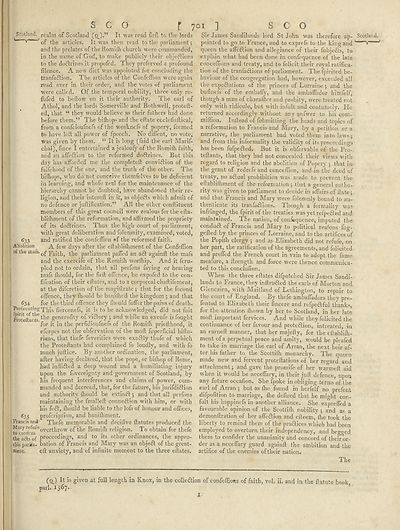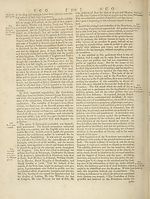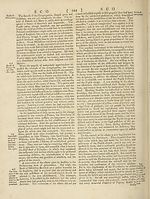Encyclopaedia Britannica, or, a Dictionary of arts, sciences, and miscellaneous literature : enlarged and improved. Illustrated with nearly six hundred engravings > Volume 18, RHI-SCR
(739) Page 701
Download files
Complete book:
Individual page:
Thumbnail gallery: Grid view | List view

SCO
tScotland, realm of Scotland (Q.).” It was read fird to tlie lords
v “ ' of the articles. It was then read to the parliament;
and the prelates of the Romilh church were commanded,
in the name of God, to make publicly their objections
to the doctrines it propofed. They preferved a profound
dlence. A new diet was appointed for concluding the
tranfaftion. The articles of the Confeflion were again
read over in their order, and the votes of parliament
were called. Of the temporal nobility, three only re-
fufed to beftow on it their authority. The earl of
Athol, and the lords Somerville and Bothwell, proteft-
ed, that “ they would believe as their fathers had done
before them.” The bifhops and the eftate ecclefiaftical,
from a confcioufnefs of the weaknefs of popery, feemed
to have loft all power of fpeech. No dilfent, no vote,
was given by them. “ It is long (faid the earl Marif-
chal),fince I entertained a jealoufy of the Romilh faith,
and an affe&ion to the reformed doftrines. But this
day has afforded me the completeft convidion of the
falfehood of the one, and the truth of the other. The
bifhops, who do not conceive themfelves to be deficient
in learning, and whofe zeal for the maintenance of the
hierarchy cannot be doubted, have abandoned their re¬
ligion, and their intereft in it, as objeifts which admit of
no defence or juftification.” All the other conftituent
members of this great council were zealous for the efta-
blilhment of the reformation, and affirmed the propriety
of its doCtrines. Thus the high court of parliament,
with great deliberation and folemnity, examined, voted,
633 and ratified the confeffion »f the reformed faith.
Abolition A few days after the eftablifhment of the Confeffion
of the mais, 0£ ^jie parliament paffed an aCt againft the mafs
and the exercife of the Romifh worfhip. And it fcru-
plcd not to ordain, that all perfons faying or hearing
rnafs ftiould, for the firft offence, be expofed to the con-
fifcation of their eftates,and to a corporeal chaftifement,
at the difcretion of the magiftrate *, that for the fecond
offence, they fliould be banifhed the kingdom ; and that
634 for the third offence they fliould fuffer the pains of death.
Perfecting'Phi* fiercenefs, it is to be acknowledged, did not fuit
Proteitarts'the generofity of victory •, and while an excufe is fought
for it in the perfidioufnefs of the Romifh priefthood, it
efcapes not the obfervation of the moft fuperficial hifto-
rians, that thefe feverities were exaClly thofe of which
the Proteftants had complained fo loudly, and with fo
much juftice. By another ordination, the parliament,
after having declared, that the pope, or bifhop of Rome,
had inflifted a deep rvound and a humiliating injury
upon the fovereignty and government of Scotland, by
his frequent interferences and claims of power, com¬
manded and decreed, that, for the future, bis jurifdiCtion
and authority fhould be extinCt j and that all perfons
maintaining the fmalleft connection with him, or with
his feCt, fhould be liable to the lofs of honour and offices,
635 profcription, and banifhment.
Francis and Thefe memorable and decifive ftatutes produced the
toc,o}n?m6overthroW ^om^1 religion. To obtain for thefe
the aifis of proceedings, and to its other ordinances, the appro-
this parka- bation of Francis and Mary was an objeCt of the great-
sient. eft anxiety, and of infinite moment to the three eftates.
SCO
Sir James Sandilands lord St John was therefore ap- Scotland,
pointed to go to France, and to exprefs to the king and 1 1
queen the affeflion and allegiance of their fubjeCts, to
explain what had been done in confequence of the late
conceffions and treaty, and to folicit their royal ratifica¬
tion of the tranfaCiions of parliament. The fpirited be¬
haviour of the congregation had, however, exceeded all
the expectations of the princes of Lorraine •, and the
bufintfs of the embaffy, and the ambaffador himfelf,
though a man of character and probity, were treated not
only with ridicule, but with infult and contumely. He
returned accordingly without any anfwer to his com-
mifiion. Inftead of fubmitting the heads and topics of
a reformation to Francis and Mary, by a petition or a
narrative, the parliament had voted them into laws 5
and from this informality the validity of its proceedings
has been fufpeded. But it is obfervable of the Pro¬
teftants, that they had not concealed their views with
regard to religion and the abolition of Popery ; that in
the grant of redrefs and conceffion, and in the deed of
treaty, no aClual prohibition was made to prevent the
eftablifhment of the reformation ; that a general autho¬
rity was given to parliament to decide in affairs of flatej
and that Francis and Mary were folemnly bound to au¬
thenticate its tranfaCiions. J hough a formality was
infringed, the fpirit of the treaties was yetrefpefted and
maintained. The nation, of confiquence, imputed the
conduCl of Francis and Mary to political reafons fug-
gefted by the princes of Lorraine, and to the artifices of
the Popifli clergy ; and as Elizabeth did not refufe, on
her part, the ratification of the agreements, and folicited
and preffed the French court in vain to adopt the fame
meafure, a ftrength and force were thence communica¬
ted to this conclufion.
When the three eftates difpatched Sir James Sandi¬
lands to France, they inftru&ed the earls of Morton and
Glencairn, with Maitland of Lethington, to repair to
the court of England. By thefe ambaffadors they pre-
fentcsd to Elizabeth their fincere and refpeClful thanks,
for the attention fhown by her to Scotland, in her late
moft important fervices. And while they folicited the
continuance of her favour and proteClion, intreated, in
an earneft manner, that her majefty, for the eftablifh¬
ment of a perpetual peace and amity, would be pleafed
to take in marriage the earl of Arran, the next heir af¬
ter his father to the Scottifh monarchy. The queen
made new and fervent proteftations of her regard and
attachment; and gave the promife of her warmeft aid
when it would be neceffary, in their juft defence, upon
any future occafion. She fpoke in obliging terms of the
earl of Arran ; but as fhe found in herfelf no prefent
difpofition to marriage, fhe defired that he might con-
fult his happinefs in another alliance. She expreffed a
favourable opinion of the Scottifh nobility ; and as a
demonftration of her affeClion and efteem,’fhe took the
liberty to remind them of the praClices which had been
employed to overturn their independency, and begged
them to confider the unanimity and concord of their or¬
der as a neceffary guard againft the ambition and the
artifice of the enemies of their nation.
The
r 701 i
(<k) 11 is given at full length in Knox, in the colle&ion of confeffions of faith, vol. ix. and in the ftatute book
pari. 1567,
I
tScotland, realm of Scotland (Q.).” It was read fird to tlie lords
v “ ' of the articles. It was then read to the parliament;
and the prelates of the Romilh church were commanded,
in the name of God, to make publicly their objections
to the doctrines it propofed. They preferved a profound
dlence. A new diet was appointed for concluding the
tranfaftion. The articles of the Confeflion were again
read over in their order, and the votes of parliament
were called. Of the temporal nobility, three only re-
fufed to beftow on it their authority. The earl of
Athol, and the lords Somerville and Bothwell, proteft-
ed, that “ they would believe as their fathers had done
before them.” The bifhops and the eftate ecclefiaftical,
from a confcioufnefs of the weaknefs of popery, feemed
to have loft all power of fpeech. No dilfent, no vote,
was given by them. “ It is long (faid the earl Marif-
chal),fince I entertained a jealoufy of the Romilh faith,
and an affe&ion to the reformed doftrines. But this
day has afforded me the completeft convidion of the
falfehood of the one, and the truth of the other. The
bifhops, who do not conceive themfelves to be deficient
in learning, and whofe zeal for the maintenance of the
hierarchy cannot be doubted, have abandoned their re¬
ligion, and their intereft in it, as objeifts which admit of
no defence or juftification.” All the other conftituent
members of this great council were zealous for the efta-
blilhment of the reformation, and affirmed the propriety
of its doCtrines. Thus the high court of parliament,
with great deliberation and folemnity, examined, voted,
633 and ratified the confeffion »f the reformed faith.
Abolition A few days after the eftablifhment of the Confeffion
of the mais, 0£ ^jie parliament paffed an aCt againft the mafs
and the exercife of the Romifh worfhip. And it fcru-
plcd not to ordain, that all perfons faying or hearing
rnafs ftiould, for the firft offence, be expofed to the con-
fifcation of their eftates,and to a corporeal chaftifement,
at the difcretion of the magiftrate *, that for the fecond
offence, they fliould be banifhed the kingdom ; and that
634 for the third offence they fliould fuffer the pains of death.
Perfecting'Phi* fiercenefs, it is to be acknowledged, did not fuit
Proteitarts'the generofity of victory •, and while an excufe is fought
for it in the perfidioufnefs of the Romifh priefthood, it
efcapes not the obfervation of the moft fuperficial hifto-
rians, that thefe feverities were exaClly thofe of which
the Proteftants had complained fo loudly, and with fo
much juftice. By another ordination, the parliament,
after having declared, that the pope, or bifhop of Rome,
had inflifted a deep rvound and a humiliating injury
upon the fovereignty and government of Scotland, by
his frequent interferences and claims of power, com¬
manded and decreed, that, for the future, bis jurifdiCtion
and authority fhould be extinCt j and that all perfons
maintaining the fmalleft connection with him, or with
his feCt, fhould be liable to the lofs of honour and offices,
635 profcription, and banifhment.
Francis and Thefe memorable and decifive ftatutes produced the
toc,o}n?m6overthroW ^om^1 religion. To obtain for thefe
the aifis of proceedings, and to its other ordinances, the appro-
this parka- bation of Francis and Mary was an objeCt of the great-
sient. eft anxiety, and of infinite moment to the three eftates.
SCO
Sir James Sandilands lord St John was therefore ap- Scotland,
pointed to go to France, and to exprefs to the king and 1 1
queen the affeflion and allegiance of their fubjeCts, to
explain what had been done in confequence of the late
conceffions and treaty, and to folicit their royal ratifica¬
tion of the tranfaCiions of parliament. The fpirited be¬
haviour of the congregation had, however, exceeded all
the expectations of the princes of Lorraine •, and the
bufintfs of the embaffy, and the ambaffador himfelf,
though a man of character and probity, were treated not
only with ridicule, but with infult and contumely. He
returned accordingly without any anfwer to his com-
mifiion. Inftead of fubmitting the heads and topics of
a reformation to Francis and Mary, by a petition or a
narrative, the parliament had voted them into laws 5
and from this informality the validity of its proceedings
has been fufpeded. But it is obfervable of the Pro¬
teftants, that they had not concealed their views with
regard to religion and the abolition of Popery ; that in
the grant of redrefs and conceffion, and in the deed of
treaty, no aClual prohibition was made to prevent the
eftablifhment of the reformation ; that a general autho¬
rity was given to parliament to decide in affairs of flatej
and that Francis and Mary were folemnly bound to au¬
thenticate its tranfaCiions. J hough a formality was
infringed, the fpirit of the treaties was yetrefpefted and
maintained. The nation, of confiquence, imputed the
conduCl of Francis and Mary to political reafons fug-
gefted by the princes of Lorraine, and to the artifices of
the Popifli clergy ; and as Elizabeth did not refufe, on
her part, the ratification of the agreements, and folicited
and preffed the French court in vain to adopt the fame
meafure, a ftrength and force were thence communica¬
ted to this conclufion.
When the three eftates difpatched Sir James Sandi¬
lands to France, they inftru&ed the earls of Morton and
Glencairn, with Maitland of Lethington, to repair to
the court of England. By thefe ambaffadors they pre-
fentcsd to Elizabeth their fincere and refpeClful thanks,
for the attention fhown by her to Scotland, in her late
moft important fervices. And while they folicited the
continuance of her favour and proteClion, intreated, in
an earneft manner, that her majefty, for the eftablifh¬
ment of a perpetual peace and amity, would be pleafed
to take in marriage the earl of Arran, the next heir af¬
ter his father to the Scottifh monarchy. The queen
made new and fervent proteftations of her regard and
attachment; and gave the promife of her warmeft aid
when it would be neceffary, in their juft defence, upon
any future occafion. She fpoke in obliging terms of the
earl of Arran ; but as fhe found in herfelf no prefent
difpofition to marriage, fhe defired that he might con-
fult his happinefs in another alliance. She expreffed a
favourable opinion of the Scottifh nobility ; and as a
demonftration of her affeClion and efteem,’fhe took the
liberty to remind them of the praClices which had been
employed to overturn their independency, and begged
them to confider the unanimity and concord of their or¬
der as a neceffary guard againft the ambition and the
artifice of the enemies of their nation.
The
r 701 i
(<k) 11 is given at full length in Knox, in the colle&ion of confeffions of faith, vol. ix. and in the ftatute book
pari. 1567,
I
Set display mode to:
![]() Universal Viewer |
Universal Viewer | ![]() Mirador |
Large image | Transcription
Mirador |
Large image | Transcription
Images and transcriptions on this page, including medium image downloads, may be used under the Creative Commons Attribution 4.0 International Licence unless otherwise stated. ![]()
| Permanent URL | https://digital.nls.uk/193028314 |
|---|
| Attribution and copyright: |
|
|---|
| Description | Ten editions of 'Encyclopaedia Britannica', issued from 1768-1903, in 231 volumes. Originally issued in 100 weekly parts (3 volumes) between 1768 and 1771 by publishers: Colin Macfarquhar and Andrew Bell (Edinburgh); editor: William Smellie: engraver: Andrew Bell. Expanded editions in the 19th century featured more volumes and contributions from leading experts in their fields. Managed and published in Edinburgh up to the 9th edition (25 volumes, from 1875-1889); the 10th edition (1902-1903) re-issued the 9th edition, with 11 supplementary volumes. |
|---|---|
| Additional NLS resources: |
|

